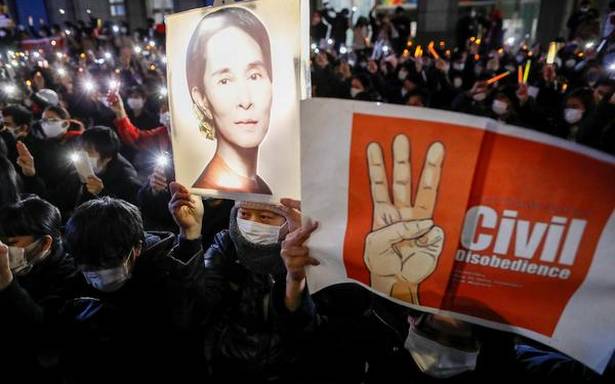Ms. Suu Kyi will now be remanded until February 17, when she will likely appear in court by videoconference.
Myanmar’s military leaders have extended their detention of deposed leader Aung San Suu Kyi, whose remand was set to expire February 15 and whose freedom is a key demand of the crowds of people continuing to protest this month’s military coup.
Ms. Suu Kyi will now be remanded until February 17, when she will likely appear in court by videoconference, according to Khin Maung Zaw, a lawyer asked by Ms. Suu Kyi’s party to represent her.
Ms. Suu Kyi’s extended detention is likely to further inflame tensions between the military, which seized power a February 1 coup, and the protesters who have taken to the streets across the nation seeking the return of the government they elected.
Protesters continued to gather across Myanmar on February 15 following a night in which authorities cut the country’s Internet access and increased the security presence in major cities seeking to curtail demonstrations.
Thousands of engineers marched on the streets of Mandalay, the country’s second-largest city, chanting and holding signs that read: “Free our leader,” “Who stands with justice?” and “Stop arresting people illegally at midnight.”
In Yangon, the country’s most populous city, fewer protesters gathered on February 15 due to the loss of the Internet and reports of military vehicles on the streets. Nevertheless, several hundred anti-coup demonstrators were outside the Central Bank of Myanmar building, where there were also military trucks full of soldiers, riot police, water-cannon trucks and armoured personnel carriers.
Demonstrators carried placards that read “#SupportCDM #SaveMyanmar.” CDM refers to the civil disobedience movement that has seen doctors, engineers and others in Myanmar refuse to work until the military releases elected political leaders and returns the country to civilian rule.
Some protesters posed for photographs in front of military vehicles while holding red signs that said “Join in CDM.”
When the military seized power, it detained Ms. Suu Kyi and members of her government and prevented recently elected lawmakers from opening a new session of Parliament. The junta, led by Senior Gen. Min Aung Hlaing, said it stepped in because the government failed to properly investigate allegations of fraud in last year’s election, which Ms. Suu Kyi’s National League for Democracy party won in a landslide. The state election commission refuted that contention, saying there is no evidence to support it.
An order on February 14 that appeared to be from the Ministry of Transport and Communications told mobile phone service providers to shut down Internet connections from 1 a.m. to 9 a.m. on February 15. It circulated widely on social media, as did a notice said to be from service provider Oredoo Myanmar containing the same details.
On February 14, ambassadors from the United States, Canada and 12 European nations called on Myanmar’s security forces to refrain from using violence against those “protesting the overthrow of their legitimate government.”
They condemned the arrests of political leaders and activists as well as the military’s interference with communications.
“We support the people of Myanmar in their quest for democracy, freedom, peace, and prosperity,” they said in a joint statement issued late night on February 14. “The world is watching.”
Source: Read Full Article

